#azure cloud solution provider
Explore tagged Tumblr posts
Text
#Mobile App Development Company near me#Mobile App Development Company#software development company in india#Cloud Consulting Services in Noida#Cloud Consulting Services#app development in noida#software development company in noida#custom software development company in noida#ios app development company in noida#AWS Cloud Services#Best Service cloud consulting providers#Microsoft Azure cloud consulting services#Cloud Consulting Services India#Amazon Cloud Consulting Services#Cloud Software Consulting Services#Devops consulting and managed cloud services#AWS cloud consulting services#Cloud Managed Services#Cloud Strategy & Consulting Service#Cloud Services#Cloud Consulting Services in India#Cloud Consulting Services & Solutions#Best software development company#Best software development company in noida#Custom Flutter App Development Company#mobile app development company near me#app development companies near me#app development company near me#mobile app development company#app development companies
0 notes
Text
Its 2025, Still waiting to migrate your business in cloud?
Lead your business by leveraging Cloud. Techjour assures you to faster to market, reduce technology cost, scale your business and in-built advanced security.

#google cloud#aws cloud#aws#startup#microsoft azure#gitlab#automation#technology#business#trendingnow#trending#technology trends#market trends#2025#cloud solutions#cloud service provider#cloud services#cloudmigration#cloudconsulting#usa news#europe#technology news#technology tips
1 note
·
View note
Text
#cloud migration tools#cloud solution provider#unifycloud#microsoft azure#app modernization#digital transformation#cloud migration#UnifyCloud
0 notes
Text
youtube
#Buy Azure Subscriptions#Azure Subscriptions#Azure#Cloud Computing#Cloud Migration#Microsoft Cloud Products#Cloud Solutions#Cloud Consulting#Cloud Solution Provider#digital transformation#Youtube
0 notes
Text
In the ever-evolving landscape of cloud computing, two giants stand out as the go-to choices for businesses and individuals alike: Amazon Web Services (AWS) and Microsoft Azure. As organisations increasingly migrate their infrastructure to the cloud, understanding the key differences and similarities between these two leading platforms becomes crucial. In this comprehensive overview, we’ll delve into the core aspects that differentiate AWS and Azure, helping you make informed decisions about which cloud provider aligns best with your needs.
#technology#Cloud Computing#Amazon Web Services (AWS)#Microsoft Azure#Cloud Service Providers#Infrastructure as a Service (IaaS)#Platform as a Service (PaaS)#Cloud Migration#Comparative Analysis#Cloud Solutions#Business Technology
0 notes
Text
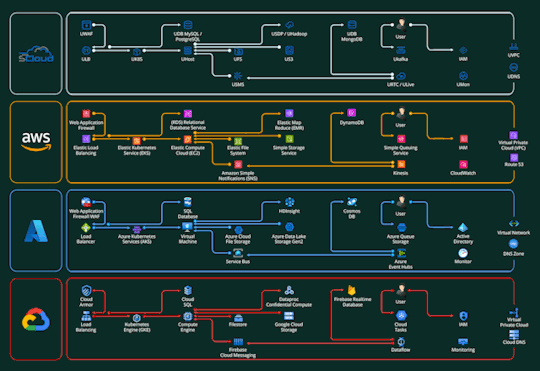
A little cheatsheet here to master our cloud as you would of any hyperscalers! Try SCloud now and see how we can be your secret weapon for enterprise success! 💪🌐
#scloud#cloud services#cloud solutions#cloud computing#aws#microsoft azure#google cloud#comparison#cheat sheet#cloud service providers#csp
0 notes
Text
Discover what sets HPI Education apart as the top choice for personal computers in NYC. Explore our unbeatable selection, cutting-edge technology, and unparalleled customer support.
#Managed IT support NYC#Managed IT service NYC#Managed it services new york#IT support new york#Cloud Services Provider NYC#Cloud Solutions in New York#Microsoft Cloud Services NYC#Microsoft Azure Cloud Services NYC#Microsoft Azure provider in nyc#Microsoft Teams Managed IT Services NYC#Office 365 Managed IT Services NYC#NYC Microsoft Office 365 Support#Microsoft Surface Hub NYC#Microsoft surface hub provider in nyc#Microsoft surface reseller services in nyc#Microsoft Dynamics 365 Consulting Services NYC#Microsoft Dynamics 365 Business Central#Chromebook Provider in NYC
0 notes
Text
How do businesses use Microsoft technologies?
Microsoft Technologies Services

In today’s fast-paced and modern digital world, businesses rely on powerful tools and resources to stay productive, secure, and competitive. Microsoft Technologies provides many solutions that help organizations streamline operations, improve communication, and grow efficiently. Companies across all industries, from small startups to large enterprises, use Microsoft tools to power their success.
Enhancing Team Collaboration and Productivity -
One of the most common uses of Microsoft Technologies is to improve how teams work together. Microsoft 365 tools like Outlook, Teams, SharePoint, and OneDrive make it easy for employees to share files, hold virtual meetings, and manage tasks in real time—no matter where they are.
Cloud Computing with Microsoft Azure -
Businesses use Microsoft Azure to host websites, applications, and databases in the cloud. Azure allows companies to scale their IT resources and tools up or down based on the objective demand, which lower costs and increases flexibility. It also supports data backup, disaster recovery, and AI-driven services.
Managing Customer Relationships -
Microsoft Dynamics 365, resources assists the companies to handle out their sales, customer service, and marketing in one place at a time. With insights powered by data and automation, businesses can build stronger customer relationships and make smarter decisions faster with the assistance of Microsoft Technologies.
Improving Security and Compliance -
With cyber threats on the rise, Microsoft Technologies offers built-in security tools to help protect sensitive data. Features like multi-factor authentication, data encryption, and compliance tracking help businesses meet industry regulations and secure their systems.
Automating Processes with Power Platform -
Tools like Power Automate and Power Apps allow businesses to create custom apps and automate repetitive tasks without writing complex code. This helps save time and lets employees focus on more important work.
Businesses use Microsoft Technologies to stay efficient, connected, and secure in a digital-first world. Whether through cloud computing, team collaboration tools, or business intelligence platforms, Microsoft remains a trusted partner for organizations looking to grow and succeed. Additionally, Microsoft and its tools support the organization with remote work offerings and hybrid environments setup, and digital transformation with ease. Their solutions helps out the businesses to stay agile and alert, adaptive to change quickly, and remain competitive in the ever-evolving market as leads towards stand out of the domain in the industry.
Partnering with Experts for Microsoft Technology -
Businesses can rely on shifting their existing system and operating structure to new mediums as if for Microsoft tools with companies and experts like Suma Soft, IBM, and Cyntexa for a hassle-free Microsoft rollout journey.
As these set of industry leaders and experts assure a smooth transition with custom solutions offerings with its adaptation into the system with advanced security measures, and ongoing support, allowing the companies to maximize the benefits of their modern digital infrastructure.
#it services#technology#saas#software#digital transformation#saas development company#saas technology
2 notes
·
View notes
Text

Aptly AVS Migration: The Smartest, Smoothest & Fastest Path to the Cloud
Migrating VMware workloads to Azure doesn’t have to be complicated. As a Microsoft Gold Partner, Aptly brings unparalleled expertise in Azure VMware Solution (AVS) migrations, helping businesses transition seamlessly to the cloud. With a global presence and a team of cloud specialists, we ensure a strategic, cost-effective, and disruption-free migration experience.
Our comprehensive cloud expertise spans Azure, VMware, and hybrid environments, allowing us to craft tailored migration strategies that align with your business goals. We take a customer-centric approach, providing personalized guidance and transparent communication at every stage of the migration.
Aptly offers 24/7 expert support, ensuring that your technology and business needs are met around the clock. Our proven cost-efficiency strategies help reduce migration expenses while maximizing long-term ROI. With a strong track record of delivering tangible benefits, we make cloud adoption smoother and smarter.
Let’s accelerate your cloud journey! Contact us at [email protected] or visit www.aptlytech.com to learn how Aptly can simplify your AVS migration today.
2 notes
·
View notes
Text
How Python Powers Scalable and Cost-Effective Cloud Solutions

Explore the role of Python in developing scalable and cost-effective cloud solutions. This guide covers Python's advantages in cloud computing, addresses potential challenges, and highlights real-world applications, providing insights into leveraging Python for efficient cloud development.
Introduction
In today's rapidly evolving digital landscape, businesses are increasingly leveraging cloud computing to enhance scalability, optimize costs, and drive innovation. Among the myriad of programming languages available, Python has emerged as a preferred choice for developing robust cloud solutions. Its simplicity, versatility, and extensive library support make it an ideal candidate for cloud-based applications.
In this comprehensive guide, we will delve into how Python empowers scalable and cost-effective cloud solutions, explore its advantages, address potential challenges, and highlight real-world applications.
Why Python is the Preferred Choice for Cloud Computing?
Python's popularity in cloud computing is driven by several factors, making it the preferred language for developing and managing cloud solutions. Here are some key reasons why Python stands out:
Simplicity and Readability: Python's clean and straightforward syntax allows developers to write and maintain code efficiently, reducing development time and costs.
Extensive Library Support: Python offers a rich set of libraries and frameworks like Django, Flask, and FastAPI for building cloud applications.
Seamless Integration with Cloud Services: Python is well-supported across major cloud platforms like AWS, Azure, and Google Cloud.
Automation and DevOps Friendly: Python supports infrastructure automation with tools like Ansible, Terraform, and Boto3.
Strong Community and Enterprise Adoption: Python has a massive global community that continuously improves and innovates cloud-related solutions.
How Python Enables Scalable Cloud Solutions?
Scalability is a critical factor in cloud computing, and Python provides multiple ways to achieve it:
1. Automation of Cloud Infrastructure
Python's compatibility with cloud service provider SDKs, such as AWS Boto3, Azure SDK for Python, and Google Cloud Client Library, enables developers to automate the provisioning and management of cloud resources efficiently.
2. Containerization and Orchestration
Python integrates seamlessly with Docker and Kubernetes, enabling businesses to deploy scalable containerized applications efficiently.
3. Cloud-Native Development
Frameworks like Flask, Django, and FastAPI support microservices architecture, allowing businesses to develop lightweight, scalable cloud applications.
4. Serverless Computing
Python's support for serverless platforms, including AWS Lambda, Azure Functions, and Google Cloud Functions, allows developers to build applications that automatically scale in response to demand, optimizing resource utilization and cost.
5. AI and Big Data Scalability
Python’s dominance in AI and data science makes it an ideal choice for cloud-based AI/ML services like AWS SageMaker, Google AI, and Azure Machine Learning.
Looking for expert Python developers to build scalable cloud solutions? Hire Python Developers now!
Advantages of Using Python for Cloud Computing
Cost Efficiency: Python’s compatibility with serverless computing and auto-scaling strategies minimizes cloud costs.
Faster Development: Python’s simplicity accelerates cloud application development, reducing time-to-market.
Cross-Platform Compatibility: Python runs seamlessly across different cloud platforms.
Security and Reliability: Python-based security tools help in encryption, authentication, and cloud monitoring.
Strong Community Support: Python developers worldwide contribute to continuous improvements, making it future-proof.
Challenges and Considerations
While Python offers many benefits, there are some challenges to consider:
Performance Limitations: Python is an interpreted language, which may not be as fast as compiled languages like Java or C++.
Memory Consumption: Python applications might require optimization to handle large-scale cloud workloads efficiently.
Learning Curve for Beginners: Though Python is simple, mastering cloud-specific frameworks requires time and expertise.
Python Libraries and Tools for Cloud Computing
Python’s ecosystem includes powerful libraries and tools tailored for cloud computing, such as:
Boto3: AWS SDK for Python, used for cloud automation.
Google Cloud Client Library: Helps interact with Google Cloud services.
Azure SDK for Python: Enables seamless integration with Microsoft Azure.
Apache Libcloud: Provides a unified interface for multiple cloud providers.
PyCaret: Simplifies machine learning deployment in cloud environments.
Real-World Applications of Python in Cloud Computing
1. Netflix - Scalable Streaming with Python
Netflix extensively uses Python for automation, data analysis, and managing cloud infrastructure, enabling seamless content delivery to millions of users.
2. Spotify - Cloud-Based Music Streaming
Spotify leverages Python for big data processing, recommendation algorithms, and cloud automation, ensuring high availability and scalability.
3. Reddit - Handling Massive Traffic
Reddit uses Python and AWS cloud solutions to manage heavy traffic while optimizing server costs efficiently.
Future of Python in Cloud Computing
The future of Python in cloud computing looks promising with emerging trends such as:
AI-Driven Cloud Automation: Python-powered AI and machine learning will drive intelligent cloud automation.
Edge Computing: Python will play a crucial role in processing data at the edge for IoT and real-time applications.
Hybrid and Multi-Cloud Strategies: Python’s flexibility will enable seamless integration across multiple cloud platforms.
Increased Adoption of Serverless Computing: More enterprises will adopt Python for cost-effective serverless applications.
Conclusion
Python's simplicity, versatility, and robust ecosystem make it a powerful tool for developing scalable and cost-effective cloud solutions. By leveraging Python's capabilities, businesses can enhance their cloud applications' performance, flexibility, and efficiency.
Ready to harness the power of Python for your cloud solutions? Explore our Python Development Services to discover how we can assist you in building scalable and efficient cloud applications.
FAQs
1. Why is Python used in cloud computing?
Python is widely used in cloud computing due to its simplicity, extensive libraries, and seamless integration with cloud platforms like AWS, Google Cloud, and Azure.
2. Is Python good for serverless computing?
Yes! Python works efficiently in serverless environments like AWS Lambda, Azure Functions, and Google Cloud Functions, making it an ideal choice for cost-effective, auto-scaling applications.
3. Which companies use Python for cloud solutions?
Major companies like Netflix, Spotify, Dropbox, and Reddit use Python for cloud automation, AI, and scalable infrastructure management.
4. How does Python help with cloud security?
Python offers robust security libraries like PyCryptodome and OpenSSL, enabling encryption, authentication, and cloud monitoring for secure cloud applications.
5. Can Python handle big data in the cloud?
Yes! Python supports big data processing with tools like Apache Spark, Pandas, and NumPy, making it suitable for data-driven cloud applications.
#Python development company#Python in Cloud Computing#Hire Python Developers#Python for Multi-Cloud Environments
2 notes
·
View notes
Text
#Cloud Consulting Services & Solutions#Cloud Services#Cloud Consulting Services#Cloud Consulting Services in India#Cloud Strategy & Consulting Service#Cloud Managed Services#AWS cloud consulting services#Devops consulting and managed cloud services#Cloud Software Consulting Services#Amazon Cloud Consulting Services#Cloud Consulting Services India#Microsoft Azure cloud consulting services#Best Service cloud consulting providers#AWS Cloud Services#Mobile App Development Company near me#Mobile App Development Company#software development company in india#Cloud Consulting Services in Noida#app development in noida#software development company in noida#custom software development company in noida#ios app development company in noida
0 notes
Text
DO YOU USE #FAAS IN YOUR #APPLICATION?
FaaS stands for Function as a Service, Subset of Serverless architecture. It allows customers to run code in response to events without managing the complex infrastructure, associated with building and launching microservices applications. FaaS helps programmers solely focus on indivisual function in application.
e.g. AWS Lambda Function belongs to FaaS
Techjour assists to Customers to integrate high end technologies to scale their #business, product or application.
#aws cloud#aws#technology#automation#google cloud#microsoft azure#cloud solutions#cloud service provider#cloud hosting in saudi arabia#cloudmigration#saas technology#saas development company#microservices#microsoft 365#startup#msme
0 notes
Text
How UnifyCloud's CloudAtlas Platform Helps in Apps and Data Assessment, Modernization, and Migration
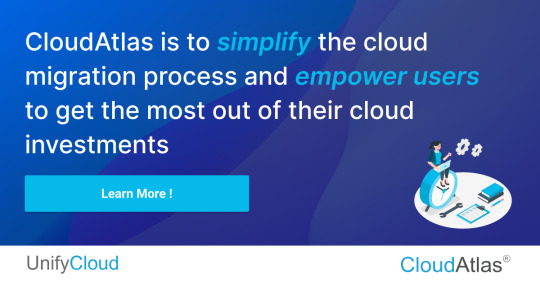
In today's digital landscape, businesses face the critical challenge of modernizing their IT infrastructure to stay competitive. UnifyCloud's CloudAtlas Platform offers a comprehensive suite of tools designed to facilitate the entire journey of cloud transformation, from initial assessment to complete migration and modernization. Here's how CloudAtlas makes this process seamless and efficient:
Comprehensive Assessment The first step in any cloud transformation journey is a thorough assessment of the existing IT environment. CloudAtlas excels in this area by providing:
Discovery and Inventory: CloudAtlas automatically discovers all applications, data, and infrastructure components within an organization's IT environment. This holistic inventory ensures nothing is overlooked, setting a solid foundation for planning. Detailed Analysis: Through deep analytics, CloudAtlas evaluates the technical and financial aspects of the existing assets. It identifies dependencies, potential risks, and the overall readiness of applications and data for the cloud. Compliance and Security Assessment: Ensuring compliance and security is paramount. CloudAtlas assesses current systems against industry standards and regulatory requirements, highlighting areas needing attention before migration.
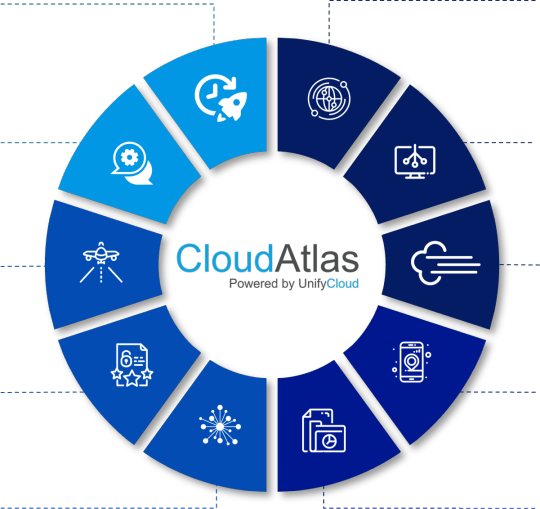
Strategic Modernization Modernizing applications and data is crucial for leveraging the full potential of cloud technologies. CloudAtlas offers:
Application Modernization: CloudAtlas provides actionable insights into how applications can be modernized. This includes refactoring, re-architecting, or re-platforming applications to better fit cloud environments. It supports technologies such as microservices, containers, and serverless computing. Data Modernization: Data is the lifeblood of modern businesses. CloudAtlas helps in transforming legacy data systems to modern databases and data lakes, ensuring enhanced performance, scalability, and security. Technical Debt Reduction: By identifying outdated components and suggesting modernization paths, CloudAtlas helps reduce technical debt, making the IT environment more agile and maintainable.
Efficient Migration Migrating to the cloud is a complex task, but CloudAtlas simplifies this with its robust migration capabilities:
Automated Migration Planning: CloudAtlas automates the creation of a detailed migration plan, including timelines, resource allocation, and risk mitigation strategies. This reduces the manual effort and minimizes errors. Migration Execution: The platform supports various migration approaches, such as lift-and-shift, re-platforming, and hybrid migrations. Its automated tools ensure a smooth transition with minimal downtime. Post-Migration Optimization: After the migration, CloudAtlas continuously monitors the cloud environment to optimize performance and cost. It provides insights for fine-tuning configurations and improving efficiency.
Cost Optimization One of the significant benefits of cloud transformation is cost efficiency. CloudAtlas helps businesses achieve this by:
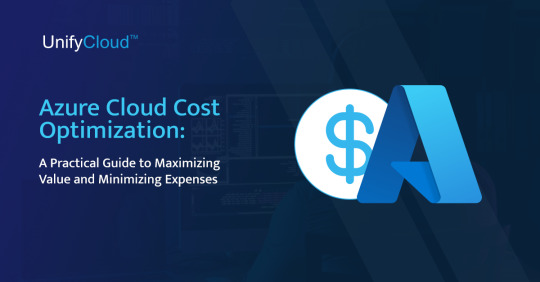
Cost-Benefit Analysis: During the assessment phase, CloudAtlas provides a detailed cost-benefit analysis, comparing on-premises costs with potential cloud savings. This helps in making informed decisions. Ongoing Cost Monitoring: Post-migration, CloudAtlas tracks cloud usage and expenses, offering recommendations to optimize resource allocation and reduce costs. Billing and Budget Management: The platform integrates with cloud service providers to manage billing and budgeting effectively, ensuring that the organization stays within its financial targets.
Security and Compliance Maintaining security and compliance is critical in the cloud. CloudAtlas addresses these concerns by:
Security Posture Assessment: It continuously assesses the security posture of the cloud environment, identifying vulnerabilities and suggesting remediation steps.
Compliance Tracking: CloudAtlas helps in maintaining compliance with industry standards and regulations by providing continuous monitoring and reporting.
Data Protection: The platform ensures that data is securely migrated and remains protected through encryption and other security measures.
Conclusion UnifyCloud's CloudAtlas Platform stands out as a comprehensive solution for businesses aiming to transform their IT infrastructure through cloud adoption. By providing end-to-end support from assessment to migration and beyond, CloudAtlas ensures a smooth, efficient, and secure transition to the cloud. This holistic approach not only accelerates the cloud transformation journey but also maximizes the benefits of cloud computing, enabling businesses to stay agile and competitive in a rapidly evolving digital landscape.
Whether you are at the beginning of your cloud journey or looking to optimize your current cloud environment, CloudAtlas offers the tools and insights needed to succeed.
#cloud migration tools#cloud solution provider#CAF#Azure#Cloud Modernization#Cloud Cost Monitoring#Azure Subscription Monitoring#Cloud Computing#Digital Transformation
0 notes
Text
Comprehensive Lift and Shift Report from CloudAtlas Infrastructure Assessment Tool
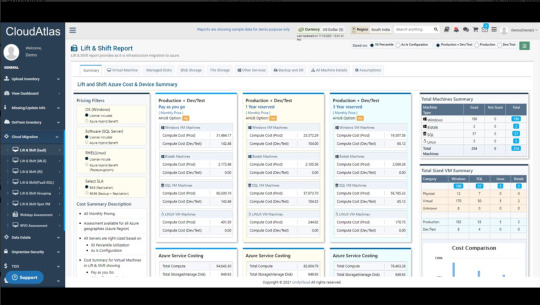
Are you ready to take your business to the next level with a seamless transition to the cloud? Our expert team has conducted an in-depth analysis of your infrastructure, and we're thrilled to present you with the most comprehensive Lift and Shift Report.
What can you expect from this report? A detailed breakdown of your current infrastructure Actionable insights for a smooth transition to the cloud Cost-effective strategies for optimizing your resources Timelines and project milestones for your cloud migration
Get ready to embrace efficiency, scalability, and cost savings like never before!
Stay tuned for more updates as we unveil the future of your cloud journey!
#cloud consulting#unifycloud india#cloud solutions#microsoft azure customer care number - customer care number#cloud solution provider#Lift and Shift#Cloud Migration#Infrastructure Assessment
0 notes
Text
Copilot Use Cases For Developers
Microsoft Copilot is revolutionizing the way developers interact with development tools, providing AI-powered assistance across a range of Microsoft products like Visual Studio, Azure, and GitHub. With Copilot integrated into these environments, developers can streamline workflows, automate routine tasks, and leverage advanced features for improved productivity. For example, in Visual Studio, Copilot helps write code faster by suggesting context-aware completions, refactoring code, and even generating entire functions based on brief descriptions. This drastically reduces the time spent on boilerplate code and increases efficiency, allowing developers to focus on more creative and complex aspects of their projects.
Furthermore, Microsoft Copilot empowers developers to work smarter by integrating with cloud-based services like Azure. By leveraging machine learning and AI, it can suggest optimized solutions, recommend cloud resources, and assist in troubleshooting infrastructure issues. This level of automation and intelligent support enables developers to make better decisions quickly, while reducing the cognitive load and manual effort needed to manage cloud-based applications. As Microsoft Copilot continues to evolve, it will increasingly become an indispensable tool in the developer toolkit, transforming how software is built and deployed in today’s fast-paced technological landscape.
Click Here to know more: https://www.intelegain.com/top-10-copilot-use-cases-in-2025/
#MicrosoftCopilot#AIForDevelopers#DevTools#ProductivityBoost#CodeCompletion#CloudDevelopment#VisualStudio#Azure#MachineLearning#AutomatedCoding#SoftwareDevelopment#TechInnovation#DeveloperEfficiency#AIinTech#DevOps
2 notes
·
View notes
Text
AI Agent Development: How to Create Intelligent Virtual Assistants for Business Success
In today's digital landscape, businesses are increasingly turning to AI-powered virtual assistants to streamline operations, enhance customer service, and boost productivity. AI agent development is at the forefront of this transformation, enabling companies to create intelligent, responsive, and highly efficient virtual assistants. In this blog, we will explore how to develop AI agents and leverage them for business success.

Understanding AI Agents and Virtual Assistants
AI agents, or intelligent virtual assistants, are software programs that use artificial intelligence, machine learning, and natural language processing (NLP) to interact with users, automate tasks, and make decisions. These agents can be deployed across various platforms, including websites, mobile apps, and messaging applications, to improve customer engagement and operational efficiency.
Key Features of AI Agents
Natural Language Processing (NLP): Enables the assistant to understand and process human language.
Machine Learning (ML): Allows the assistant to improve over time based on user interactions.
Conversational AI: Facilitates human-like interactions.
Task Automation: Handles repetitive tasks like answering FAQs, scheduling appointments, and processing orders.
Integration Capabilities: Connects with CRM, ERP, and other business tools for seamless operations.
Steps to Develop an AI Virtual Assistant
1. Define Business Objectives
Before developing an AI agent, it is crucial to identify the business goals it will serve. Whether it's improving customer support, automating sales inquiries, or handling HR tasks, a well-defined purpose ensures the assistant aligns with organizational needs.
2. Choose the Right AI Technologies
Selecting the right technology stack is essential for building a powerful AI agent. Key technologies include:
NLP frameworks: OpenAI's GPT, Google's Dialogflow, or Rasa.
Machine Learning Platforms: TensorFlow, PyTorch, or Scikit-learn.
Speech Recognition: Amazon Lex, IBM Watson, or Microsoft Azure Speech.
Cloud Services: AWS, Google Cloud, or Microsoft Azure.
3. Design the Conversation Flow
A well-structured conversation flow is crucial for user experience. Define intents (what the user wants) and responses to ensure the AI assistant provides accurate and helpful information. Tools like chatbot builders or decision trees help streamline this process.
4. Train the AI Model
Training an AI assistant involves feeding it with relevant datasets to improve accuracy. This may include:
Supervised Learning: Using labeled datasets for training.
Reinforcement Learning: Allowing the assistant to learn from interactions.
Continuous Learning: Updating models based on user feedback and new data.
5. Test and Optimize
Before deployment, rigorous testing is essential to refine the AI assistant's performance. Conduct:
User Testing: To evaluate usability and responsiveness.
A/B Testing: To compare different versions for effectiveness.
Performance Analysis: To measure speed, accuracy, and reliability.
6. Deploy and Monitor
Once the AI assistant is live, continuous monitoring and optimization are necessary to enhance user experience. Use analytics to track interactions, identify issues, and implement improvements over time.
Benefits of AI Virtual Assistants for Businesses
1. Enhanced Customer Service
AI-powered virtual assistants provide 24/7 support, instantly responding to customer queries and reducing response times.
2. Increased Efficiency
By automating repetitive tasks, businesses can save time and resources, allowing employees to focus on higher-value tasks.
3. Cost Savings
AI assistants reduce the need for large customer support teams, leading to significant cost reductions.
4. Scalability
Unlike human agents, AI assistants can handle multiple conversations simultaneously, making them highly scalable solutions.
5. Data-Driven Insights
AI assistants gather valuable data on customer behavior and preferences, enabling businesses to make informed decisions.
Future Trends in AI Agent Development
1. Hyper-Personalization
AI assistants will leverage deep learning to offer more personalized interactions based on user history and preferences.
2. Voice and Multimodal AI
The integration of voice recognition and visual processing will make AI assistants more interactive and intuitive.
3. Emotional AI
Advancements in AI will enable virtual assistants to detect and respond to human emotions for more empathetic interactions.
4. Autonomous AI Agents
Future AI agents will not only respond to queries but also proactively assist users by predicting their needs and taking independent actions.
Conclusion
AI agent development is transforming the way businesses interact with customers and streamline operations. By leveraging cutting-edge AI technologies, companies can create intelligent virtual assistants that enhance efficiency, reduce costs, and drive business success. As AI continues to evolve, embracing AI-powered assistants will be essential for staying competitive in the digital era.
5 notes
·
View notes